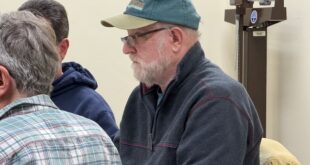
People who live in the southern end of Franklin Township have the longest life expectancy of any group of residents anywhere else in Somerset County.
Using Census data paired with the Township ward maps, township researches found that Ward 1 residents – bordered roughly by Jacques Lane, Route 27 and Canal Road – live an average of 88.1 years.
The average life expectancy of Somerset County residents is 81.8 years, while the overall average life expectancy of Franklin Township residents is 81.9 years, according to the researchers.
The research is being coordinated by Tara Kenyon, the township’s Open Space Consultant, and Saffie Kallon, the township’s Special Project’s Manager.
Average life expectancy of township residents is just one aspect being studied in a health assessment being coordinated by Kenyon and Kallon, in conjunction with the non-profit Sustainable Jersey, an organization that “researches best practices for what communities could and should do to contribute to a sustainable future,” according to its web site.
The study’s over-arching finding so far is that where one lives in the township could have an impact on how long they live.
Those who live in Ward 2 – roughly bordered by Easton Avenue, Weston and Weston Canal roads – is 82 years, according to the data.
The average life expectancy of Ward 3 residents – located between Canal and Weston roads, John F. Kennedy Boulevard, Bennetts Lane and Route 27 – is 85 years, according to the data.
Those who live in Ward 4 – roughly between Amwell Road, Route 27, Highland Avenue and Hamilton Street – have an average life expectancy of 77.3 years, according to the data.
The average life expectancy of Ward 5 residents – roughly between Easton Avenue, Winston Drive, JFK Boulevard and Culver Street – is 82 years, according to the data.
Kenyon and Kallon have been conducted focus groups with residents throughout the township, and will continue them virtually until the end of November.
A survey is also available on the township web site, and can be accessed here.
Kenyon told the Open Space Advisory Committee on November 15 that about 500 people have taken the survey.
Kenyon said in an email that the health assessment will go a long way to determining why there’s a discrepancy in life expediencies throughout the township.
“Finding this out is why the ‘For the Well of It’ Community Health Assessment is so important for Franklin Township,” she wrote. “Our goal is to move Franklin toward a place where there is equitable access to health and health resources.”
“We’re asking Franklinites about their access to transportation, nutrition, health services, recreation and more to formulate a comprehensive picture of health for all of Franklin,” she wrote. “This will allow us to fill the gaps that exist, thereby addressing disparities on a systematic level.”
“The valuable input from these sessions will allow us to assess available health resources, health access, and existing disparities within the Township,” Kallon wrote in an email. “The steering committee, with technical assistance from Sustainable Jersey, will use this vital information to develop an Action Plan in an effort to move the Township towards health equity.”
Kenyon said the differences in life expediencies within a town “are quite common.”
“Woodbridge did a similar study and came up with similar differences,” she said.
Kenyon said the committee will look at different factors in determining reasons for the discrepancies.
“You look at what’s the zoning there, are there more urban uses, less access to open space and locally grown foods,” she said. “Is there preventative care available.”
“The outcome will be we’ll come up with some recommendations to move us toward health equity,” she said.
“We’re never going to be able to make it so every single portion of Franklin is equal in terms of health situations, but what we can do, is maybe we understand that in Ward 4 there needs to be better access to open space and recreation,” she said.
“After the data collection, we will come up with an action plan and recommended projects,” she said. “Some will be simple; some will be long-term.”
 The Franklin Reporter & Advocate Eight Villages, One Community
The Franklin Reporter & Advocate Eight Villages, One Community

